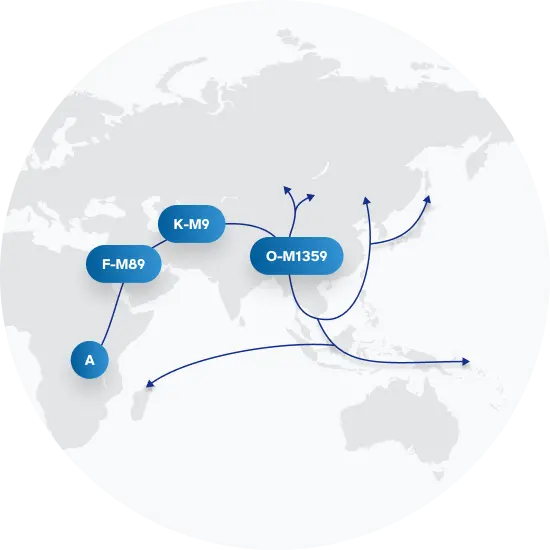Explore the Family Name Nice
How common is the last name Nice in the United States?
Based on the Decennial U.S. Census data, the popularity of the surname "Nice" saw a slight decline in rank from 2000 to 2010, moving from 8945 to 9090, marking a change of -1.62%. However, the actual count of individuals with this surname increased by 6.96% during the same period, rising from 3361 to 3595. Yet, when considering the proportion per 100,000 people, there was a slight decrease of -2.4%, going from 1.25 to 1.22.
| 2000 | 2010 | Change | |
|---|---|---|---|
| Rank | #8,945 | #9,090 | -1.62% |
| Count | 3,361 | 3,595 | 6.96% |
| Proportion per 100k | 1.25 | 1.22 | -2.4% |
Race and Ethnicity of people with the last name Nice
Concerning the ethnicity associated with the surname "Nice", again referring to the Decennial U.S. Census data, the majority identified as White with a slight decrease in its percentage from 95.63% in 2000 to 93.63% in 2010. Ethnic identities such as Asian/Pacific Islander and Black observed increases of 35.56% and 25.66% respectively, although they made up a minor proportion of the total. The Hispanic community also saw a significant increase in the use of the surname Nice, jumping by 84.67%. The proportion of those identifying as two or more ethnicities went up by 33.61%. The American Indian and Alaskan Native category experienced a minor decrease of -8.33%.
| 2000 | 2010 | Change | |
|---|---|---|---|
| White | 95.63% | 93.63% | -2.09% |
| Hispanic | 1.37% | 2.53% | 84.67% |
| Two or More Races | 1.19% | 1.59% | 33.61% |
| Black | 1.13% | 1.42% | 25.66% |
| Asian/Pacific Islander | 0.45% | 0.61% | 35.56% |
| American Indian and Alaskan Native | 0.24% | 0.22% | -8.33% |
Nice ancestry composition
23andMe computes an ancestry breakdown for each customer. People may have ancestry from just one population or they may have ancestry from several populations. The most commonly-observed ancestry found in people with the surname Nice is British & Irish, which comprises 42.2% of all ancestry found in people with the surname. The next two most common ancestries are French & German (33.0%) and Scandinavian (6.3%). Additional ancestries include Eastern European, Italian, Ashkenazi Jewish, Spanish & Portuguese, and Indigenous American.
Ready to learn more about your ancestry? Get the most comprehensive ancestry breakdown on the market by taking our DNA test. Shop 23andMe
| ANCESTRY BREAKDOWN | COMPOSITION |
|---|---|
| British & Irish | 42.2% |
| French & German | 33.0% |
| Scandinavian | 6.3% |
| Other | 18.5% |

Possible origins of the surname Nice
Your DNA provides clues about where your recent ancestors may have lived. Having many distant relatives in the same location suggests that you may all share common ancestry there. Locations with many distant relatives can also be places where people have migrated recently, such as large cities. If a large number of individuals who share your surname have distant relatives in a specific area, it could indicate a connection between your surname and that location, stemming from either recent ancestral ties or migration.
Based on 23andMe data, people with last name Nice have recent ancestry locations all within the United Kingdom of Great Britain and Northern Ireland.
| RECENT ANCESTRY Location | Percentage |
|---|---|
| Tyne And Wear, United Kingdom | 85.30% |
| Merseyside, United Kingdom | 85.30% |
| Greater London, United Kingdom | 85.30% |
| Glasgow City, United Kingdom | 84.00% |
| West Yorkshire, United Kingdom | 84.00% |
What Nice haplogroups can tell you
Haplogroups are genetic population groups that share a common ancestor on either your paternal or maternal line. These paternal and maternal haplogroups shed light on your genetic ancestry and help tell the story of your family.
The top paternal haplogroup of people with the surname Nice is O-F2415, which is predominantly found among people with East Asian & Indigenous American ancestry. Haplogroup O-F2415 is descended from haplogroup O-M1359. Other common haplogroups include E-M183 and O-F2859, which are predominantly found among people with European and East Asian & Indigenous American ancestry.
The most common maternal haplogroups of people with Nice surname are: H1, H, T2. These most commonly trace back to individuals of European ancestry.
 Paternal Haplogroup Origins O-M1359
Paternal Haplogroup Origins O-M1359
Your paternal lineage may be linked to the Cham
One of the many populations harboring members of haplogroup O1b1a1a1a1 is the Cham ethnic group, a group of people who speak Austronesian languages in Mainland Southeast Asia. Austronesian languages make up a language family that is extremely large and widespread, comprising over 350 million people on islands such as Madagascar, Easter Island, and many others. However, Austronesian languages are less common on mainland Asia, with a notable exception being the Chamic language. Research suggests that ancestors of the Cham people migrated from Southeast Asian islands to the mainland around the year 500 BCE, and that early Cham populations quickly began mixing with indigenous southern Vietnamese populations. As a result, the Chamic language now has words that were borrowed from languages spoken by indigenous Vietnamese people. It is likely that an ancestral Kinh population was one of the populations that mixed with the Cham people shortly after their migration to mainland Asia.
Your maternal lineage may be linked to Marie Antoinette
Because it is so dominant in the general European population, haplogroup H also appears quite frequently in the continent's royal houses. Marie Antoinette, an Austrian Hapsburg who married into the French royal family, inherited the haplogroup from her maternal ancestors. So did Prince Philip, Duke of Edinburgh, whose recorded genealogy traces his female line to Bavaria. Scientists also discovered that famed 16th century astronomer Nicolaus Copernicus traced his maternal lineages to haplogroup H.

What do people with the surname Nice have in common?
Spoiler alert: it's complicated. People with the same last name are usually no more genetically similar than a randomly sampled group of people from the same population. That said, people with the same surname are more likely to have similar ancestries than randomly sampled individuals. The reason is the tendency of people with similar cultural or geographical backgrounds to preferentially mate with one another. That's why people who share a surname may be more likely to share traits and tendencies in common than people within the general population. Check out the percentages below to see the prevalences of tastes, habits, and traits of people with your surname compared with prevalences among 23andMe users.
Preferences
Traits
Habits
Wellness

Migraine
A severe headache characterized by intense pain, sensitivity to light and sound, and often accompanied by nausea and vomiting.
"Nice" Surname 17.4%
23andMe Users 16.4%
Are health conditions linked to the last name Nice?
The short answer is that, if there is an association between surname and health, it's usually more about your ancestry than your name. Individuals with a given surname are no more genetically similar than the general population but often have similar ancestries. The populations of people associated with those shared ancestries often have sets of genetic variations, also known as alleles, in common. Some of those alleles are associated with a greater likelihood of developing certain diseases.
Disease variant frequency by ancestry
Disease allele frequencies in populations associated with the surname Nice are shown below. Important Note: not everyone with a disease allele will develop these health condition














